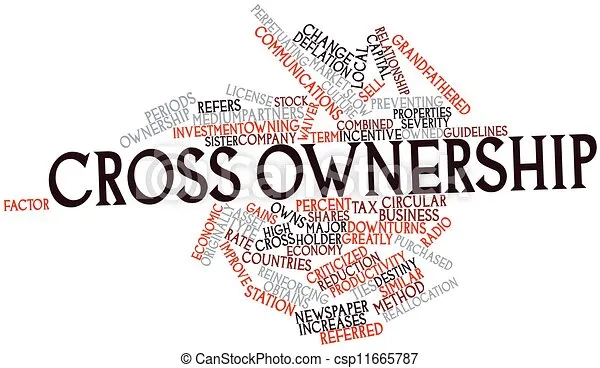
However, the revised draft of Law on Credit Institutions is a matter of great concern to the people because it is closely related to future economic development which is currently being manipulated by cross-ownership.
Cross-ownership at many levels
For many years, dealing with cross-ownership was among the two most prominent and difficult problems in the process of restructuring the commercial banking system in Vietnam, besides bad debts. Since 2011, the process of dealing with cross-ownership has started to be implemented through mergers, consolidation, and divestments. By 2019, the Inspection Agency under the State Bank of Vietnam said it had basically erased the cross-ownership matrix in the commercial banking system, and the number of credit institutions that directly cross-owned each other had basically been overcome.
However, according to the State Bank of Vietnam, the phenomenon of major shareholders of credit institutions and related people has continued to dominate governance activities, leading to risks in the operations of credit institutions. These are being used to establish a company and use family members to indirectly increase share ownership in commercial banks without violating the regulations on share ownership limit.
Accordingly, the selection of the bank leader is a formality, and there is an executive behind who can influence the decision to grant credit to their so-called backyard businesses. A common occurrence is that cross-ownership will create a powerful group that can be manipulated through the members of the Board of Directors, thereby approving credit packages beyond all regulatory laws. This leads to a crisis in banks.
Cross-ownership is now changing in form compared to previous years, and though it is no longer as obvious as before, it is more dangerous when capital contribution becomes a virtual currency. For instance, an enterprise issues bonds and the bank buys them, and then the business uses the money to sell bonds to buy back shares of the bank to then own the banks. Just like that, an enterprise establishes hundreds of subsidiaries, and the subsidiaries issue bonds, and the bank then buys these bonds.
Dr. Lê Xuân Nghĩa, a member of the National Financial and Monetary Policy Advisory Council, said that there is a phenomenon of cross-ownership that can be seen by the inspectors of the State Bank of Vietnam, but this phenomenon can only be discovered when the security agency investigates.
At a recent seminar on resolving difficulties for real estate businesses, Dr. Lê Xuân Nghĩa emphasized that the enterprises that are currently facing difficulties are not owned by banks. In contrast, corporations that own banks are relatively stable, because they have banks supporting them and can restructure bad debts, reverse debts, and not transfer to debt groups. This shows that cross-ownership in manipulating the bank will be a danger in the future.
Tough rules necessary
In the revised draft of the Law on Credit Institutions submitted to the National Assembly, the State Bank of Vietnam has proposed to amend the share ownership ratio of shareholders in credit institutions from 5 percent to 3 percent for individual shareholders; 15 percent to 10 percent for institutional shareholders; and 20 percent to 15 percent for shareholders and related people. At the same time, the draft will also add regulations on related people, cases of not holding the same position, and reduce the rate of credit granted to customers and related persons.
However, reducing the share ownership ratio of shareholders who are individuals, organizations, and related people, or reducing the rate of credit extension with customers and related persons to combat share ownership and bank manipulation may be a good measure but still not the optimal one. Because those who deliberately manipulate the banks will still have people related to them, including companies or individuals that are not in the category of related parties and hence will be difficult to control.
According to Mr. Vương Đình Huệ, Chairman of the National Assembly, share ownership is not about a 5 percent or 3 percent ownership, but it is an important factor for supervision and public reporting to know the relevant legal entity as well as to govern the operations of a bank. Mr. Vương Đình Huệ emphasized that the Central Resolution has made it very clear that it is necessary to end and not just restrict share ownership. However, the current reality is that there are financial groups where a parent company may be a credit institution or a corporation. This fact should be recognized and fundamentally revised in the Law on Credit Institutions.
So as to end this situation, in addition to reducing the ownership ratio as proposed by the State Bank of Vietnam, some economic experts believe that the law should expand rules for disclosure of information on the ownership ratio in banks, including shareholders with a commercial bank ownership rate of 1 percent or more, and related persons of shareholders must also disclose information with a commercial bank if ownership ratio is of 1 percent or more. This provision will make it easier to identify shared ownership relationships.
Dr. Nguyễn Trí Hiếu, a financial and banking expert, suggested that the management of the share ownership ratio should be strictly implemented by the Inspection and Supervision Agency, and those who violate its rules must be subjected to administrative fines, and if there are signs of deception, this must be handled as a criminal offense. Also, all banks that make dishonest declarations must have their operating licenses revoked. In other words, it is only through strict management and tough regulations that regulatory compliance can be achieved.




















